cowboys
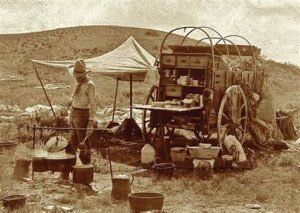 After watching numerous old western shows about cattle drives, most of us would automatically assume that a chuckwagon is a staple on any cattle drive. That is not the case, however. In the early years of cattle drives, the cowboys were supposed to supply their own food, and had to survive on what they could forage and carry. With that in mind, hiring cowboys for the drive was tough. Cowboys were usually paid about $25 to $40 a month, so to have to buy food out of that too, doesn’t make cattle driving a “get rich quick” kind of job. Basically, cattle ranchers ended up with people who couldn’t get a job anywhere else, and they usually weren’t loyal or very good at their job. They might even walk off the job before the drive was over.
After watching numerous old western shows about cattle drives, most of us would automatically assume that a chuckwagon is a staple on any cattle drive. That is not the case, however. In the early years of cattle drives, the cowboys were supposed to supply their own food, and had to survive on what they could forage and carry. With that in mind, hiring cowboys for the drive was tough. Cowboys were usually paid about $25 to $40 a month, so to have to buy food out of that too, doesn’t make cattle driving a “get rich quick” kind of job. Basically, cattle ranchers ended up with people who couldn’t get a job anywhere else, and they usually weren’t loyal or very good at their job. They might even walk off the job before the drive was over.
It was a big problem for ranchers, who needed to have reliable, as well as capable cowboys to work the drives. Finally, one rancher, a man named Charles Goodnight, while pondering the problem he had in getting good working cowboys for his cattle drive. Then, he hit upon an idea. Goodnight created a type of field kitchen covered wagon. It is unknown if the name comes from the fact that the inventor is Charles (Chuck) or if it referenced chuck as a slang term for food. “Goodnight modified a Studebaker-manufactured covered wagon, a d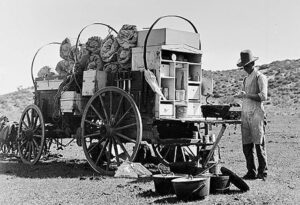 urable Civil War army-surplus wagon, to suit the needs of cowboys driving cattle from Texas to sell in New Mexico. He added a ‘chuck box’ to the back of the wagon, with drawers and shelves for storage space and a hinged lid to provide a flat working surface. A water barrel was also attached to the wagon and canvas was hung underneath to carry firewood. A wagon box was used to store cooking supplies and cowboys’ personal items.” It is said that Goodnight’s main motivation for the chuckwagon, was to be able to hire a better class of cowboy and keep them throughout the cattle drive.
urable Civil War army-surplus wagon, to suit the needs of cowboys driving cattle from Texas to sell in New Mexico. He added a ‘chuck box’ to the back of the wagon, with drawers and shelves for storage space and a hinged lid to provide a flat working surface. A water barrel was also attached to the wagon and canvas was hung underneath to carry firewood. A wagon box was used to store cooking supplies and cowboys’ personal items.” It is said that Goodnight’s main motivation for the chuckwagon, was to be able to hire a better class of cowboy and keep them throughout the cattle drive.
“Chuckwagon food typically included easy-to-preserve items such as baked beans, salted meats, coffee, and sourdough biscuits. Food would also be gathered en route. There was no fresh fruit, vegetables, or eggs available, and meat was not fresh unless an animal was injured during the run and therefore had to be killed. The meat they ate was greasy cloth-wrapped bacon, salt pork, and beef, usually dried, salted or smoked. On cattle drives, it was common for the “cookie” who ran the wagon to be second in authority only to the “trailboss.” The cookie would often act as cook, barber, dentist, and banker.” A typical trail boss made $100 to $125 a month, and the cook usually made about $60. 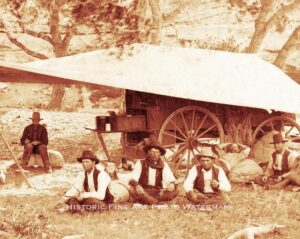 The cook was vital to the cattle drive and was not to be crossed. The men were to keep their distance from the chuckwagon, because dust would get in the food. The horses left camp downwind of the chuckwagon for the same reason. No one dared take the last serving of food until they were sure that everyone had been served. To leave food on their plates was an insult to the cook. The cooks had long days…up before dawn to prepare food. After the men left for work, they cleaned up camp and washed dishes, then went to the next camp site to begin dinner for the men’s arrival. After dinner they cleaned up and went to bed. The next day would soon arrive. They more than earned their wage and the special wagon they got to use.
The cook was vital to the cattle drive and was not to be crossed. The men were to keep their distance from the chuckwagon, because dust would get in the food. The horses left camp downwind of the chuckwagon for the same reason. No one dared take the last serving of food until they were sure that everyone had been served. To leave food on their plates was an insult to the cook. The cooks had long days…up before dawn to prepare food. After the men left for work, they cleaned up camp and washed dishes, then went to the next camp site to begin dinner for the men’s arrival. After dinner they cleaned up and went to bed. The next day would soon arrive. They more than earned their wage and the special wagon they got to use.

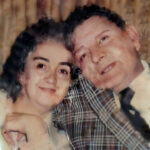 My uncle, Bill Beadle was a unique kind of man. He loved all things cowboy, western, and especially the Old West. I suppose it’s possible that he was rather living in the wrong era. It’s not that God made a mistake and put him in the wrong time, but sometimes our own preferences make us feel like we might have been better suited to a different era. I’m quite sure that his family would have argued that point with him anyway, if he were to suggest that he should have lived in the Old West. Really though, for Uncle Bill, it wasn’t about living in the Old West, it was about loving Wyoming…and he really did.
My uncle, Bill Beadle was a unique kind of man. He loved all things cowboy, western, and especially the Old West. I suppose it’s possible that he was rather living in the wrong era. It’s not that God made a mistake and put him in the wrong time, but sometimes our own preferences make us feel like we might have been better suited to a different era. I’m quite sure that his family would have argued that point with him anyway, if he were to suggest that he should have lived in the Old West. Really though, for Uncle Bill, it wasn’t about living in the Old West, it was about loving Wyoming…and he really did.
He loved all the outdoor activities that were favorites of his. He loved to hunt and fish. He loved spending time with his family in the great outdoors. His sons were his favorite companions…other than my Aunt Virginia, of 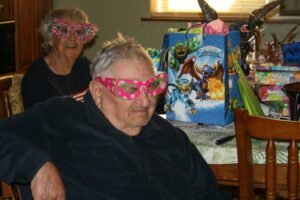 course. He was born in Worland, Wyoming, and he always loved Wyoming. This would be the place he wanted most to be.
course. He was born in Worland, Wyoming, and he always loved Wyoming. This would be the place he wanted most to be.
Uncle Bill was always funny and humorous, and I liked visiting with him. When his memory started to go, Uncle Bill could no longer come to the family parties, and so, many of us lost track of him. He struggled to communicate with family, and it simply became easier to just stay home and not try to carry on those conversations. I really miss those times with Uncle Bill. Today would have been Uncle Bill’s 93rd birthday. Happy birthday in Heaven, Uncle Bill. We love and miss you very much.
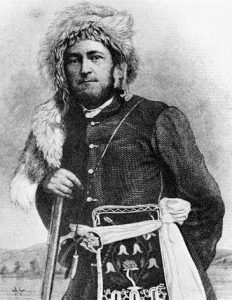 Many people who love the era of the Cowboys and Indians, also find themselves intrigued by the Mountain Men. These men were the epitome of the “wild” west. The Mountain Men were often what many might call “social rejects,” because they lived in the wilderness, hunted and fished to sustain themselves, and were often trappers who sold their furs to supplement their living. All that seems rather normal, but they were also reclusive, and often had long hair and a bushy beard. I suppose that many people would think that our opinion of the mountain men was discriminatory, but we have always had some concerns over those who were so very different. Maybe we even associated the mountain men with lawlessness. They often lived in the wilderness, because the were non-conformists when it came to the law. It wasn’t that they wanted to rob banks and kill people, but rather that they wanted to be free to live their lives the way they saw fit, without all the rules and regulations of society.
Many people who love the era of the Cowboys and Indians, also find themselves intrigued by the Mountain Men. These men were the epitome of the “wild” west. The Mountain Men were often what many might call “social rejects,” because they lived in the wilderness, hunted and fished to sustain themselves, and were often trappers who sold their furs to supplement their living. All that seems rather normal, but they were also reclusive, and often had long hair and a bushy beard. I suppose that many people would think that our opinion of the mountain men was discriminatory, but we have always had some concerns over those who were so very different. Maybe we even associated the mountain men with lawlessness. They often lived in the wilderness, because the were non-conformists when it came to the law. It wasn’t that they wanted to rob banks and kill people, but rather that they wanted to be free to live their lives the way they saw fit, without all the rules and regulations of society.
One such mountain man, was Joe Meek, who was born in Virginia in 1810. Meek was a friendly and relentlessly good-humored young man. Unfortunately, Meek did not have a the same interest in school, that he did to be a friendly, funny guy. In reality, his biggest problem was that he had too much energy to sit still and learn. After finally giving up on schooling, at 16 years old, Meek moved west to join two of his brothers in Missouri. Meek later found a need to read and write, and so taught himself, but his spelling and grammar were said to be “highly original” throughout his life.
In early 1829, Meek joined William Sublette’s ambitious expedition to begin fur trading in the Far West. This was the perfect lifestyle for Meek, and he found himself flourishing. Meek traveled throughout the West for the next decade, thoroughly enjoying the adventure and independence of the mountain man life. Meek was an average man, standing 6 feet 2 inches tall. He wore a heavy beard, and became a favorite character at the annual mountain-men rendezvous, where he regaled his companions with humorous and often exaggerated stories of his wilderness adventures. Meek, who was a well known grizzly hunter, claimed he liked to “count coup” on the dangerous animals before killing them, a variation on a Native American practice in which they shamed a live human enemy by tapping them with a long stick. Meek also claimed to have wrestled an attacking grizzly with his bare hands, before finally sinking a tomahawk into its brain. I suppose it might have been a tall tale, but more than one mountain man hs fought a bear. Some have won, and some have not had the same outcome…sadly.
Meek may have been a misfit in society, but he had good relations with many Native Americans, and in fact, he married three Indian women during his lifetime, including the daughter of a Nez Perce chief. Still, that good relationship didn’t prevent him from getting into some squabbles with the tribes. Many of the Indians didn’t like the incursion of the mountain men into their territories, and periodically, things got hostile. In the spring of 1837, Meek was nearly killed by a Blackfeet warrior who was taking aim with his bow while Meek tried to reload his Hawken rifle. Luckily for Meek, the warrior dropped his first arrow while drawing the bow, and the mountain man had time to reload and shoot.
Finally, in 1840, Meek saw that the golden era of the free trappers was ending. He decided that it was time for a “career change.” Meek and another mountain man, along with Meek’s third wife guided one of the first wagon trains to cross the Rockies on the Oregon Trail. Once there, Meek settled in the lush Willamette Valley of western Oregon, became a farmer, and actively encouraged other Americans to join him. He could see that 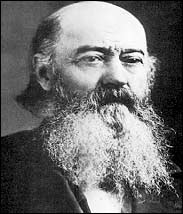 times were changing. In 1847, Meek led a delegation to Washington DC, asking for military protection from Indian attacks and territorial status for Oregon. After the long journey, Meek arrived in Washington DC “ragged, dirty, and lousy.” Nevertheless, he became something of a celebrity in the capitol…maybe a little bit like “Crocodile Dundee.” Meek was a novelty, and the Easterners relished the boisterous good humor Meek showed in proclaiming himself the “envoy extraordinary and minister plenipotentiary from the Republic of Oregon to the Court of the United States.” The trip was quite successful, and Congress responded by making Oregon an official American territory and Meek became a US marshal.
times were changing. In 1847, Meek led a delegation to Washington DC, asking for military protection from Indian attacks and territorial status for Oregon. After the long journey, Meek arrived in Washington DC “ragged, dirty, and lousy.” Nevertheless, he became something of a celebrity in the capitol…maybe a little bit like “Crocodile Dundee.” Meek was a novelty, and the Easterners relished the boisterous good humor Meek showed in proclaiming himself the “envoy extraordinary and minister plenipotentiary from the Republic of Oregon to the Court of the United States.” The trip was quite successful, and Congress responded by making Oregon an official American territory and Meek became a US marshal.
Strangely, considering his anti-social beginnings, Meek returned to Oregon and became heavily involved in politics, eventually helping to found the Oregon Republican Party. He later retired to his farm, where he died on June 20, 1875 at the age of 65.
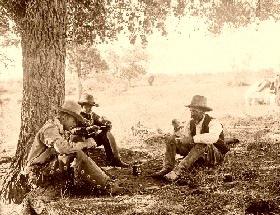 First chronicled by the famous western writer, Zane Grey, in his 1934 novel The Code of the West, no “written” code ever actually existed. However, the hardy pioneers who lived in the west were bound by these unwritten rules that centered on hospitality, fair play, loyalty, and respect for the land. These days, little of that code remains, or so it seems. These days, the more someone can get away with, he better they seem to like it. That just wasn’t the case for the people of thee old West. They needed to know that they could count on their neighbors, friends, and yes, even strangers
First chronicled by the famous western writer, Zane Grey, in his 1934 novel The Code of the West, no “written” code ever actually existed. However, the hardy pioneers who lived in the west were bound by these unwritten rules that centered on hospitality, fair play, loyalty, and respect for the land. These days, little of that code remains, or so it seems. These days, the more someone can get away with, he better they seem to like it. That just wasn’t the case for the people of thee old West. They needed to know that they could count on their neighbors, friends, and yes, even strangers
Ramon Adams, a Western historian, explained it best in his 1969 book, The Cowman and His Code of Ethics, saying, in part: “Back in the days when the cowman with his herds made a new frontier, there was no law on the range. Lack of written law made it necessary for him to frame some of his own, thus developing a rule of behavior which became known as the “Code of the West.” These homespun laws, being merely a gentleman’s agreement to certain rules of conduct for survival, were never written into statutes, but were respected everywhere on the range.”
Though the cowman might break every law of the territory, state and federal government, he took pride in upholding his own unwritten code. His failure to abide by it did not bring formal punishment, but the man who broke it became, more or less, a social outcast. His friends “hazed him into the cutbacks” and he was subject to the punishment of the very code he had broken. Though the Code of the West was always unwritten, here is a “loose” list of some of the guidelines: Don’t inquire into a person’s past. Take the measure of a man for what he is today. Never steal another man’s horse. A horse thief pays with his life. Defend yourself whenever 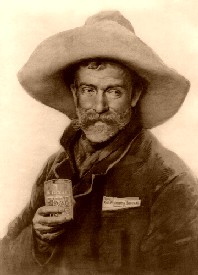 necessary. Look out for your own. Remove your guns before sitting at the dining table. Never order anything weaker than whiskey. Don’t make a threat without expecting dire consequences. Never pass anyone on the trail without saying “Howdy”. When approaching someone from behind, give a loud greeting before you get within shooting range. Don’t wave at a man on a horse, as it might spook the horse. A nod is the proper greeting. After you pass someone on the trail, don’t look back at him…it implies you don’t trust him. Riding another man’s horse without his permission is nearly as bad as making love to his wife. Never even bother another man’s horse. Always fill your whiskey glass to the brim. A cowboy doesn’t talk much; he saves his breath for breathing. No matter how weary and hungry you are after a long day in the saddle, always tend to your horse’s needs before your own, and get your horse some feed before you eat. Cuss all you want, but only around men, horses and cows. Complain about the cooking and you become the cook. Always drink your whiskey with your gun hand, to show your friendly intentions. Do not practice ingratitude. A cowboy is pleasant even when out of sorts. Complaining is what quitters do, and cowboys hate quitters. Always be courageous. Cowards aren’t tolerated in any outfit worth its salt. A cowboy always helps someone in need, even a stranger or an enemy. Never try on another man’s hat. Be hospitable to strangers. Anyone who wanders in, including an enemy, is welcome at the dinner table. The same was true for riders who joined cowboys on the range. Give your enemy a fighting chance. Never wake another man by shaking or touching him, as he might wake suddenly and shoot you. Real cowboys are modest. A braggart who is “all gurgle and no guts” is not tolerated. Be there for a friend when he needs you. Drinking on duty is grounds for instant dismissal and blacklisting. A cowboy is loyal to his “brand,” to his friends, and those he rides with. Never shoot an unarmed or unwarned enemy. This was also known as “the rattlesnake code”: always warn before you strike. However, if a man was being stalked, this could be ignored. Never shoot a woman no matter what.
necessary. Look out for your own. Remove your guns before sitting at the dining table. Never order anything weaker than whiskey. Don’t make a threat without expecting dire consequences. Never pass anyone on the trail without saying “Howdy”. When approaching someone from behind, give a loud greeting before you get within shooting range. Don’t wave at a man on a horse, as it might spook the horse. A nod is the proper greeting. After you pass someone on the trail, don’t look back at him…it implies you don’t trust him. Riding another man’s horse without his permission is nearly as bad as making love to his wife. Never even bother another man’s horse. Always fill your whiskey glass to the brim. A cowboy doesn’t talk much; he saves his breath for breathing. No matter how weary and hungry you are after a long day in the saddle, always tend to your horse’s needs before your own, and get your horse some feed before you eat. Cuss all you want, but only around men, horses and cows. Complain about the cooking and you become the cook. Always drink your whiskey with your gun hand, to show your friendly intentions. Do not practice ingratitude. A cowboy is pleasant even when out of sorts. Complaining is what quitters do, and cowboys hate quitters. Always be courageous. Cowards aren’t tolerated in any outfit worth its salt. A cowboy always helps someone in need, even a stranger or an enemy. Never try on another man’s hat. Be hospitable to strangers. Anyone who wanders in, including an enemy, is welcome at the dinner table. The same was true for riders who joined cowboys on the range. Give your enemy a fighting chance. Never wake another man by shaking or touching him, as he might wake suddenly and shoot you. Real cowboys are modest. A braggart who is “all gurgle and no guts” is not tolerated. Be there for a friend when he needs you. Drinking on duty is grounds for instant dismissal and blacklisting. A cowboy is loyal to his “brand,” to his friends, and those he rides with. Never shoot an unarmed or unwarned enemy. This was also known as “the rattlesnake code”: always warn before you strike. However, if a man was being stalked, this could be ignored. Never shoot a woman no matter what.
Consideration for others is central to the code, such as: Don’t stir up dust around the chuck wagon, don’t wake 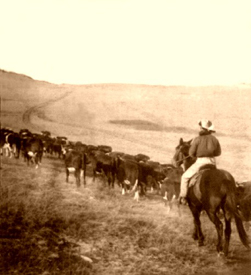 up the wrong man for herd duty, etc. Respect the land and the environment by not smoking in hazardous fire areas, disfiguring rocks, trees, or other natural areas. Honesty is absolute – your word is your bond, a handshake is more binding than a contract. Live by the Golden Rule. “The Code of the West was a gentleman’s agreement to certain rules of conduct. It was never written into the statutes, but it was respected everywhere on the range.“ Ramon F. Adams
up the wrong man for herd duty, etc. Respect the land and the environment by not smoking in hazardous fire areas, disfiguring rocks, trees, or other natural areas. Honesty is absolute – your word is your bond, a handshake is more binding than a contract. Live by the Golden Rule. “The Code of the West was a gentleman’s agreement to certain rules of conduct. It was never written into the statutes, but it was respected everywhere on the range.“ Ramon F. Adams
As I read through these “codes,” I have to think just how sad it is that so little of that beautiful code is practiced these days, and how very sad that is.
 For my nephew, Dave Chase, each year is defined by the sports that have taken place, and the games he has been to. Whether Dave is watching sports or participating in them, it’s all about sports. Dave is kind of a complex guy. He is very family oriented, and wants his family to lead happy and fulfilled lives, but he is very much a guy, and that means that while his wife, my niece, Toni has a wide variety of interests, and he sees her personality in their home and all she has done with it, but when it comes to what Toni is doing at any given time, Dave’s mind starts zoning out to…you guessed it…sports. I think that the girly things Toni likes, while making their home wonderful, comfortable, and homey, are things that Dave can’t really wrap his head around, because…well, they don’t have anything to do with sports. About Toni’s activities, Dave says, “I’m a male. I don’t remember what Toni has been doing for the last week, let alone the last year. I am not good at details. I just have an analytical engineering mind.” Every time I read that it makes me giggle. It is just so typically Dave, and I find it hilarious to say the least.
For my nephew, Dave Chase, each year is defined by the sports that have taken place, and the games he has been to. Whether Dave is watching sports or participating in them, it’s all about sports. Dave is kind of a complex guy. He is very family oriented, and wants his family to lead happy and fulfilled lives, but he is very much a guy, and that means that while his wife, my niece, Toni has a wide variety of interests, and he sees her personality in their home and all she has done with it, but when it comes to what Toni is doing at any given time, Dave’s mind starts zoning out to…you guessed it…sports. I think that the girly things Toni likes, while making their home wonderful, comfortable, and homey, are things that Dave can’t really wrap his head around, because…well, they don’t have anything to do with sports. About Toni’s activities, Dave says, “I’m a male. I don’t remember what Toni has been doing for the last week, let alone the last year. I am not good at details. I just have an analytical engineering mind.” Every time I read that it makes me giggle. It is just so typically Dave, and I find it hilarious to say the least.
It was a good year in sports for Dave’s competitive teams. His co-ed softball team placed first in Division A, his basketball team went undefeated for the season and they are now competing for first place. For Dave it is the thrill of the competition, and that doesn’t just mean in physical sports. Dave has been playing Cribbage most of his life. His dad taught him how, and continues to be the one person Dave can’t beat. In the last three cribbage tournaments that Dave’s been in he placed 3rd, 2nd, and 1st, in that order.
Dave isn’t picky about what level the sports are in either. His favorite college team is, of course, the Wyoming Cowboys. As any Wyoming fan knows, they did pretty well in 2017, and they are doing excellent at basketball as well, except for the fact that they lost today…darn it!! Nevertheless, for Dave the best way to spend a birthday is at a game, which is where he was today. I just wish it had been a better game for his birthday. A couple of weeks ago, Dave managed to be in the right place at the right time to get caught on television at a Wyoming game. While that may not make him a celebrity, it’s cool to be spotted at the game, courtesy of the news.
Outside of Wyoming, Dave is a huge Dodgers, Lakers and Kings fan. The Dodgers did awesome in baseball this  year, even though they didn’t win the pennant. It’s hard to say how the Kings are doing this year, because it’s too early to tell yet, but Dave says that the Lakers have been struggling for a while, but a true fan never gives up on their team…right. And the Rams…now that they’re back in LA…are Dave’s new football team…even if 2017 wasn’t their year. And Unlike Dave, who has no idea what is going on in Toni’s world, Toni has been watching his, and she is very much in the know about every team Dave likes. Way to go Toni!! As Toni said, “All I know it’s been a great year in sports for Dave, and definitely a year where his talents got better with age.” Today is Dave’s birthday. Happy birthday Dave!! Have a great day!! We love you!!
year, even though they didn’t win the pennant. It’s hard to say how the Kings are doing this year, because it’s too early to tell yet, but Dave says that the Lakers have been struggling for a while, but a true fan never gives up on their team…right. And the Rams…now that they’re back in LA…are Dave’s new football team…even if 2017 wasn’t their year. And Unlike Dave, who has no idea what is going on in Toni’s world, Toni has been watching his, and she is very much in the know about every team Dave likes. Way to go Toni!! As Toni said, “All I know it’s been a great year in sports for Dave, and definitely a year where his talents got better with age.” Today is Dave’s birthday. Happy birthday Dave!! Have a great day!! We love you!!
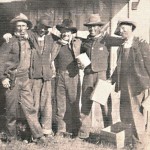 We have all watched old Western shows, and the cowboys always seem to look very romantic…at least for the period of history they lived in, but the reality was not exactly like that. Now, I can’t say for sure that none of the cowboys of that day looked like that, but the majority of those men were hard working homesteaders, who lived in an era where there was no running water, and all too often the water they had was needed for crops. The land was hard and dry, and tough to work, because it had never had crops planted in it before. There were rocks to be removed before the land could even be tilled. This was the world our ancestors lived in…if they came out to the wild west, like mine did.
We have all watched old Western shows, and the cowboys always seem to look very romantic…at least for the period of history they lived in, but the reality was not exactly like that. Now, I can’t say for sure that none of the cowboys of that day looked like that, but the majority of those men were hard working homesteaders, who lived in an era where there was no running water, and all too often the water they had was needed for crops. The land was hard and dry, and tough to work, because it had never had crops planted in it before. There were rocks to be removed before the land could even be tilled. This was the world our ancestors lived in…if they came out to the wild west, like mine did.
Now don’t get me wrong…they did their best to clean up, when they cleaned up, and they looked real good, but the daily shower that we take for granted, was not possible in those days. Often the same water was used for more than one person, and you had to hope that you weren’t going to be the last one. The cowboys of the old west took a weekly bath and washed their hair every couple of weeks…most of the time…or sometimes anyway. They did not understand hygiene, because no one really knew anything about that then. 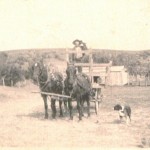 And they couldn’t have done much about it if they had, without any running water.
And they couldn’t have done much about it if they had, without any running water.
The roads were dirt, the land was dusty, the sun was hot, and the people…well, the people were as clean as they could be under the circumstances, but since the only odor improving items were the perfumes that the women used very sparingly, people just got used to the odors that existed. They were around horses and cows all day, and they had to clean up after those animals. It wasn’t their fault, and there really was nothing that they could have done about it in most cases…it was just the way it really was in the old west, and they were the real cowboys.

